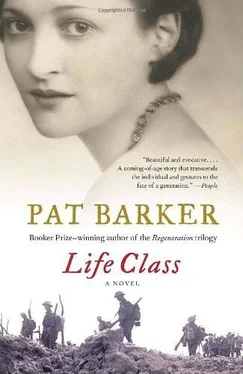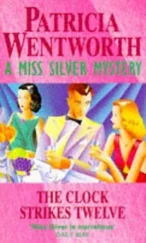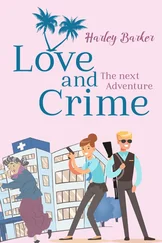Richard Lewis to Elinor Brooke
I’m afraid I have rather bad news. You must be wondering why you’ve had no reply to your last letter. Please don’t be alarmed. Paul is ill but is being well looked after. What happened was that he accidentally cut through his glove while dressing a badly infected wound. He washed his hands as soon as he noticed the cut, but the trouble is he’s got chilblains rather badly at the moment — we all have — and although they itch like mad they also make your fingers feel quite numb and so he didn’t notice immediately. (They also make you rather clumsy, which is how the accident came to happen, I suppose.) Infected fingers aren’t unusual. All our hands are in a real mess. But Paul developed a high temperature and has had to spend several days in bed, the last two of them on the ward, so he’s having the unusual experience of seeing the ward from both sides. Everybody’s making a tremendous fuss of him so he’s thoroughly spoiled. Whenever one of the other orderlies has a spare moment they go and sit with him. They are a thoroughly decent set of chaps. I don’t think you could find better anywhere.
I have very happy memories of the evening the three of us spent together, even though it did come to a rather dramatic end. I hope you’re keeping well and once again don’t be too concerned. Paul is in good hands and I’m sure he will soon be on the mend. Which will be a relief to all of us since he makes a far better orderly than he does a patient!
Elinor Brooke to Richard Lewis
Thank you for letting me know about Paul. It was a great shock to get the news, though I was beginning to suspect he was ill because I hadn’t had a letter from him for almost a week. He is such a reliable correspondent despite being so busy (whereas I am a rather bad one, despite leading what some might call an idle life). Give him my love and best wishes for a speedy recovery.
I too have very happy memories of that evening in Ypres, though it seems a long time ago now. Perhaps one day we can all meet again in more peaceful circumstances. I would like that.
Paul to Elinor
I expect by now you’ve had Lewis’s letter. He’s been very kind to me throughout, fussing over me like a mother. (Not that mine ever did, but you know what I mean.) Before I was transferred to the ward he was always racing back to the hut to make sure I was all right. What a stupid accident. And such a small cut too. I went off duty and into town quite cheerfully, feeling no ill effects. The following day was my day off and I wanted to spend the night in the room so I could start painting as soon as it was light.
There was a particular painting I wanted to finish. It shows a gowned, masked, capped, gloved (ah, yes!) figure, standing by the bed of a man with gangrene, getting ready to do one of those awful hydrogen-peroxide dressings. The face is of a particular patient whose wound I used to dress — now dead, poor chap. I should have left it till morning when my mind would have been clearer, but no, I had to get it out and look at it by gaslight, and the longer I looked the more menacing the figure became. Though it’s clearly a nurse or a doctor so I don’t know where the sense of horror came from. I couldn’t make up my mind whether it needed more work or not, so in the end I put it away and went out for a drink.
By now the cut was throbbing, but after a few glasses of wine it felt better. I was drinking in a cellar — several of the cafés that were hit during the bombardment have opened again, but many of them use their cellars.
I was drinking on my own, but then I happened to bump into Neville. I’m suppose it’s surprising it hasn’t happened sooner. After all, we’ve never been more than five kilometres apart. We raised a glass to your good self, had a little chat about this and that — he’s nursing German prisoners, did you know? — and parted. A few minutes later, back in the room, I could hardly believe he’d been there at all. The whole meeting seemed like some hallucination from the past.
By morning I was really quite ill and, after trying and failing to work on the painting, I gave up and went back to the hospital where I was promptly put to bed by Lewis. The hours drifted past in a blur after that, except that the throbbing in the finger increased. By the middle of the night it really hurt and next day, after breakfast, Lewis summoned Sister Byrd who summoned Mr Burton and I was transferred to the ward. All the patients who were well enough to take an interest thought it a huge joke. And there I lay and sweated and mithered. Every so often I caught a glimpse of my finger, which was swollen out of all recognition and didn’t seem to belong to me. By this time it was stiff, hard, pink, shiny and drooling pus from a cut near the tip. I thought I’d caught the infection from the brush while painting the gangrenous patient who died. I also at one point thought I was dying, but it didn’t seem to matter very much.
And then the lancing of the wound, lavish dressings of antiseptic paste — there’s a new one out, Sister Byrd swears by it — and gradually my temperature started to come down. I came round to find myself shivering in cold wet sheets with Lewis sitting by my bed.
It’s been quite an experience. The odd thing is that though I know now that it was cutting myself while dressing an infected wound that caused all the trouble, part of me still believes I caught it from the brush. The true belief and the delusion sit quite happily side by side.
Today Lewis took me to the room to see the painting — which is finished. If I’d worked on it any more I’d have ruined it. It’s the best thing I’ve ever done and yet I don’t like it. It reeks of some kind of Faustian pact. No, that’s ridiculous — and pompous. I’m not expressing myself very well. I need to see you face to face to tell you what I mean. Oh, yes, desperately, desperately, I need to see you face to face. But it’s not possible. Write soon, my dearest love. Ever your Paul.
Paul to Elinor
Ambulances at last. I’ve left the hospital. So has Lewis, we’re here together in a ruined village in what used to be the school. All the houses are in ruins, but the school is untouched except for a hole in the roof. I’ve realized something about ruins. When it first happens they’re shocked, like patients coming out of theatre, then gradually they start to get over it, they don’t mind so much and acquire a raffish, anarchic air, flowers and weeds sprouting from improbable places like trimmings on a hat. We’ve raided the houses to make the school comfortable, chairs, beds, sofas, even rugs. We are very comfortable indeed and you needn’t worry about me. We have good supplies of wood for the stove. In fact the smell of woodsmoke and tobacco is so powerful it reminds me of the life class at the Slade. When I’m sitting dozing in an armchair in the middle of the afternoon, I half expect Tonks to walk in. Is that really the best you can do ? He grows in my memory. Isn’t that strange?
‘Dozing in an armchair in the middle of the afternoon?’ I hear you say. Yes! We work at night and even then not every night. I’m amazed how much easier this is than working in the hospital. We do twenty-four hours on, twenty-four hours off, but in quiet times the hours off can extend to days. (Equally, of course, in a bad patch we’re on duty all the time.) There’s much more time for drawing than there used to be. I’m doing a lot — I daren’t think how many drawings I’ve got — but there’s also cards and football. We kick a ball around every morning to keep ourselves fit. Then after breakfast we work on the ambulances, who are a bevy of extremely demanding ladies, I can tell you. I’m not much use at that, I can do the basic emergency repairs but nothing complicated. Fortunately there are two chaps here who can strip an engine down and reassemble it in record time.
Читать дальше












